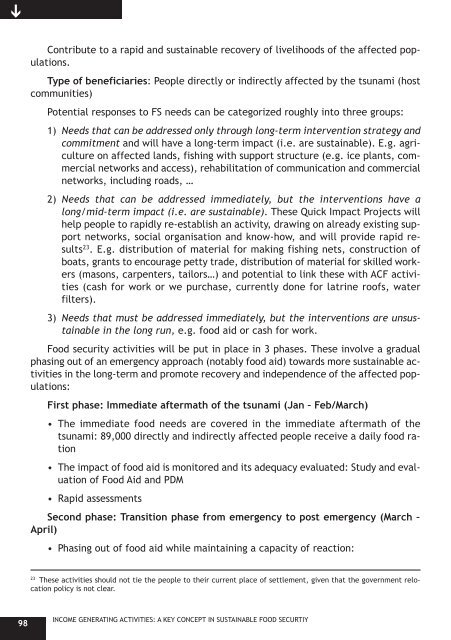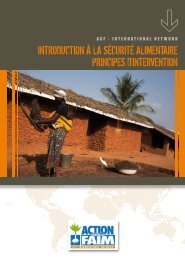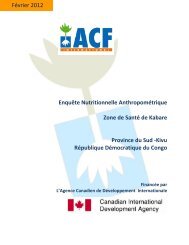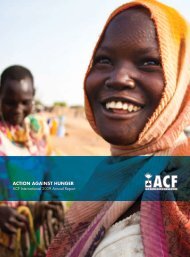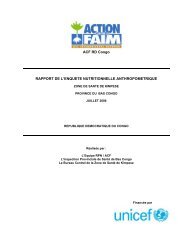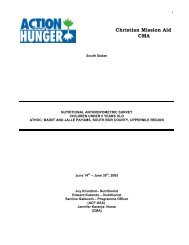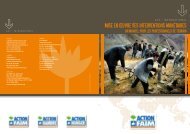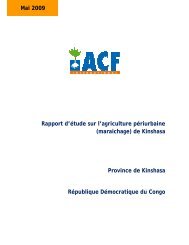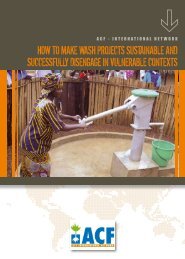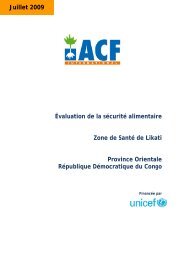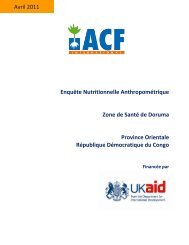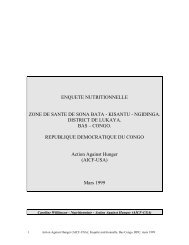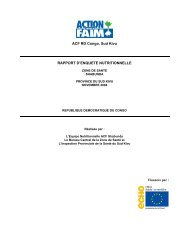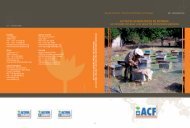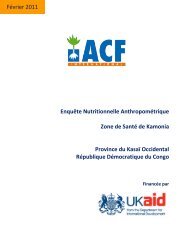Income-Generating Activities - Action Against Hunger
Income-Generating Activities - Action Against Hunger
Income-Generating Activities - Action Against Hunger
Create successful ePaper yourself
Turn your PDF publications into a flip-book with our unique Google optimized e-Paper software.
➔<br />
Contribute to a rapid and sustainable recovery of livelihoods of the affected populations.<br />
Type of beneficiaries: People directly or indirectly affected by the tsunami (host<br />
communities)<br />
Potential responses to FS needs can be categorized roughly into three groups:<br />
1) Needs that can be addressed only through long-term intervention strategy and<br />
commitment and will have a long-term impact (i.e. are sustainable). E.g. agriculture<br />
on affected lands, fishing with support structure (e.g. ice plants, commercial<br />
networks and access), rehabilitation of communication and commercial<br />
networks, including roads, …<br />
2) Needs that can be addressed immediately, but the interventions have a<br />
long/mid-term impact (i.e. are sustainable). These Quick Impact Projects will<br />
help people to rapidly re-establish an activity, drawing on already existing support<br />
networks, social organisation and know-how, and will provide rapid results<br />
23 . E.g. distribution of material for making fishing nets, construction of<br />
boats, grants to encourage petty trade, distribution of material for skilled workers<br />
(masons, carpenters, tailors…) and potential to link these with ACF activities<br />
(cash for work or we purchase, currently done for latrine roofs, water<br />
filters).<br />
3) Needs that must be addressed immediately, but the interventions are unsustainable<br />
in the long run, e.g. food aid or cash for work.<br />
Food security activities will be put in place in 3 phases. These involve a gradual<br />
phasing out of an emergency approach (notably food aid) towards more sustainable activities<br />
in the long-term and promote recovery and independence of the affected populations:<br />
First phase: Immediate aftermath of the tsunami (Jan – Feb/March)<br />
• The immediate food needs are covered in the immediate aftermath of the<br />
tsunami: 89,000 directly and indirectly affected people receive a daily food ration<br />
• The impact of food aid is monitored and its adequacy evaluated: Study and evaluation<br />
of Food Aid and PDM<br />
• Rapid assessments<br />
Second phase: Transition phase from emergency to post emergency (March –<br />
April)<br />
• Phasing out of food aid while maintaining a capacity of reaction:<br />
23<br />
These activities should not tie the people to their current place of settlement, given that the government relocation<br />
policy is not clear.<br />
98<br />
INCOME GENERATING ACTIVITIES: A KEY CONCEPT IN SUSTAINABLE FOOD SECURTIY


